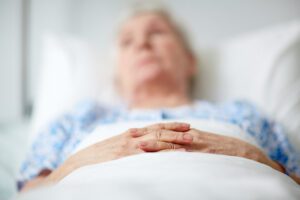6 Hygiene Tips for Bed-Bound Seniors
 Being confined to your bed, whether due to chronic illness, injury, disability, or advanced age, comes with many challenges. Personal hygiene can often top the list. Feeling clean and presentable is important for both physical and mental health.
Being confined to your bed, whether due to chronic illness, injury, disability, or advanced age, comes with many challenges. Personal hygiene can often top the list. Feeling clean and presentable is important for both physical and mental health.
Here are some helpful tips for caregivers assisting those who are bedbound with hygiene issues:
- Bathe regularly. In most cases, bedbound seniors will need someone else to give them a bed bath. Start by gathering the following items: bath towels, hand towels, facecloths, soft sponges, a bucket of warm water, gentle (non-irritating) soap, a washbasin, cotton swabs, nail brush, moisturizer, and body powder. Before starting the bathing process, place bath towels underneath the senior to keep the bed dry. Begin by gently washing the eyes and face with a moist hand towel or sponge; avoid using soap so the face doesn’t get irritated. For both modesty and warmth, only expose the part of the body that you’re actively cleaning. Roll down the sheet or blanket to begin cleaning the upper body and arms with a clean, moist towel or sponge. If you use a gentle cleansing soap, monitor to be sure it’s not causing skin irritation. Then move on to the legs. Clean around and under fingernails and toenails with a nail brush or cotton swab. Thoroughly clean the person’s back, genitals, and buttocks, gently turning or rolling the patient as needed. Dry any skin folds or hard-to-reach areas completely. Dip the person’s feet into a washbasin and use a sponge or towel to clean them. Finally, apply a moisturizer and/or body lotion all over the body to keep skin hydrated, which helps to prevent infection (especially if someone has eczema). Gently but thoroughly dry the person’s body and change him or her into a clean set of clothes.
- Clean hair. Hair should be thoroughly washed at least once a week, or more often if it gets especially oily or dirty. In between washes, use a dry shampoo if hair starts to get greasy or uncomfortable. To wash hair in bed, first place towels under the head and shoulders. Drape another towel over the shoulders, or use a hair stylist’s cape if available. Remove any tangles with a comb. If the older adult has a full head of hair, it can be easier to separate the hair into sections with a clip. Add warm water to a spray bottle and wet the hair, adding a small amount of shampoo. Start at the scalp and move down to the ends of the hair. Rinse with a separate spray bottle. After you’ve finished cleaning all the person’s hair, wrap it up in a dry towel for a few moments, then gently use a hairdryer to completely dry it.
- Trim nails. It’s important to trim long or jagged nails on older people regularly to prevent them from accidentally scratching and hurting themselves. Equally as important, they can pose as a health risk when dirt and bacteria get trapped under the nails and transfer to the skin, potentially resulting in infection. Use nail clippers and a nail file to create a smooth, rounded shape.
- Change bedding. While those who aren’t bedridden can wait a week or two in between changing their bedding, those who are bedbound don’t have that luxury. When a person lies in the same bed 24/7, it’s easy to accumulate food crumbs, hair, sweat, and dead skin cells.
- Brush teeth after each meal. Unhealthy teeth and gums can lead to disease, especially in older adults. Be sure to help seniors clean their mouths after each meal. They should also floss and rinse twice a day to remove any trapped food particles. If you bring them a spit bucket, toothbrush, toothpaste, floss, and water, many will be able to perform this task on their own.
- Tidy up the room. Clutter can have a negative impact on one’s mental and emotional wellbeing, especially if the person has to spend all day looking at it. Keep the bedroom comfortable and organized, removing any clutter from the floor. When the person is temporarily out of the room, dust it thoroughly, as excessive dust can cause sneezing, itching, breathing problems, or throat discomfort. Take away any unfinished food so it doesn’t attract household pests. Try to get as much natural light into the room as possible, and open the windows if practical to keep the air fresh.
Caregivers must pay attention to more than just their patient’s physical health. By making sure the older adult is clean and the room is fresh, you’ll be helping to ensure that the person’s emotional and mental health is good as well!
